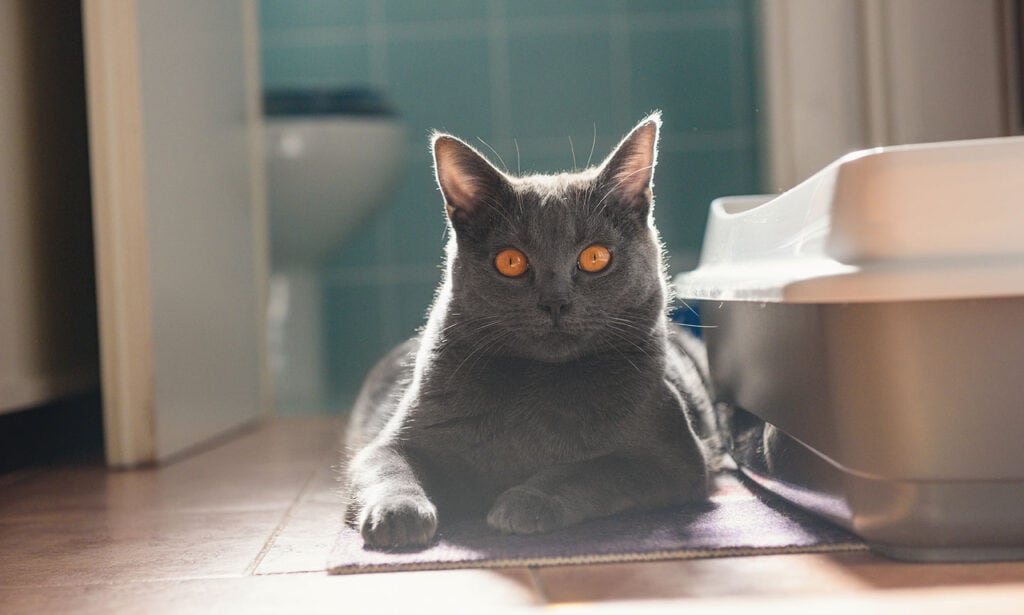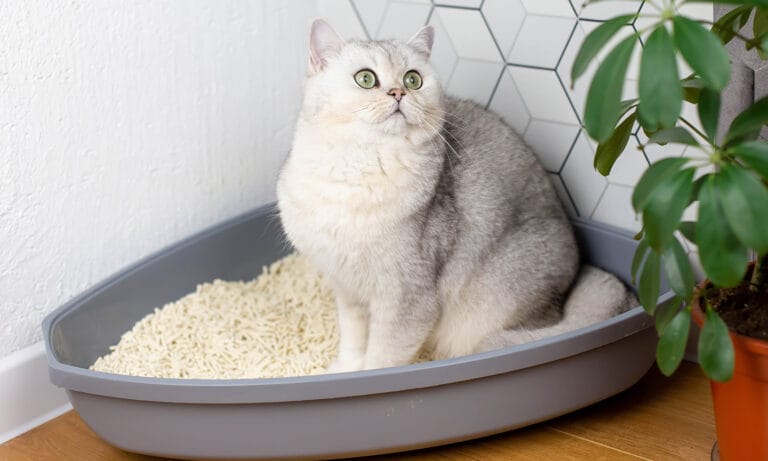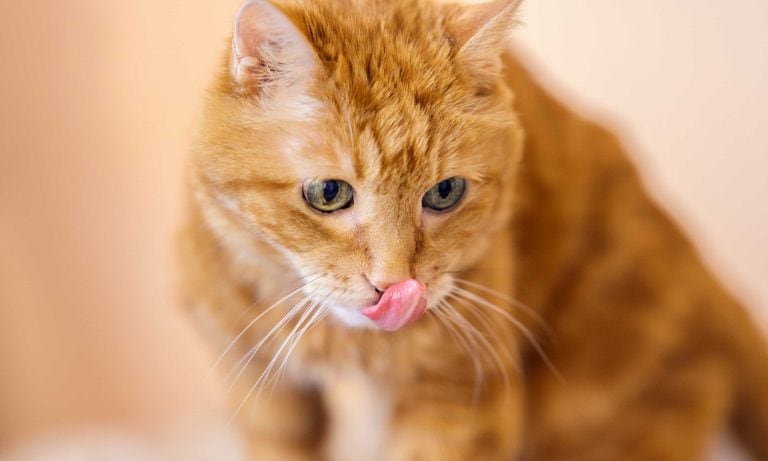In This Guide:
What Is Cat Constipation?
Constipation is when your cat is having infrequent or difficult bowel movements, and the stools are hard and dry. It occurs when the cat has a buildup of feces in their colon, making it difficult to eliminate it.
Ernie Ward, DVM, author and chief veterinary officer at VerticalVet in Charlotte, North Carolina, says that because the colon absorbs water, when feces remain in the colon for too long, it gets dry and tough, making it even harder for your cat to pass. “When they try to go, they might strain excessively, causing pain in their abdominal area,” he says.
Sometimes a constipated cat passes only a small amount of liquid poop. It may look like diarrhea, but it’s actually because the liquid poop passes around the hard, dry stools stuck in the colon. A small amount of blood may appear, because the cat is straining so hard.
Constipation sometimes leads to obstipation, a severe form of constipation in which no stool passes for several days, and results in a large buildup of feces in the colon.
Causes of Constipation in Cats
Constipation is seen most commonly in middle-aged (7-10 years old) and older cats, although it may occur at any age, Dr. Ward says. Common causes of cat constipation include:
- Obesity and/or lack of exercise
- Hairballs, especially in long-haired cats
- Ingestion of foreign bodies causing an obstruction in the digestive tract
- Pelvic injuries resulting in a narrowed pelvic canal
- Snacking on plants and grasses
- Dehydration/Not drinking enough water
- Certain medications
- Underlying disease, like hyperthyroidism, diabetes, arthritis, neurological issues, or kidney disease
- Litter box issues
Dr. Ward also points out that, in some cases, no obvious cause can be identified, and that constipation is a common symptom associated with idiopathic (unknown cause) megacolon, a condition in which the colon is consistently stretched out more than it should be.
Signs and Symptoms of Cat Constipation
If you think your cat might be having trouble, watch for these common signs of constipation:
- Unusually dry, hard stools
- Going in and out of the litter box multiple times with little to no stool production
- Straining or crying in the litter box
- Avoiding the litter box completely or going outside the litter box
- Not eating, decreased appetite, and/or changes in drinking habits
- Hiding
- Walking stiffly
- Hunched posture
- Nausea and/or vomiting
- Abdominal pain
Diagnosing Cat Constipation
To make a constipation diagnosis, Dr. Ward says your vet will consider your cat’s clinical signs, their medical history, and they’ll try to palpate or feel the accumulated fecal material in the colon (unless the cat is obese or in obvious pain).
X-rays can help determine the severity of the constipation and allow your vet to look for causes, such as pelvic injuries, colonic strictures, obstructions, arthritis, and tumors. X-rays are also the primary test for diagnosing megacolon. An ultrasound may be ordered as well.
Additionally, blood tests are recommended to rule out metabolic diseases like diabetes, thyroid, and kidney disease.
Treating Cat Constipation
Treating constipation in cats at home is not recommended because of the potential for a more severe and urgent underlying cause (chronic diseases like hyperthyroidism, diabetes, or kidney disease). Always take your cat to the vet if you believe something is wrong.
Cat Constipation Remedies From the Vet
Medical treatment of cat constipation varies depending on the cause and severity.
Initial treatment from your veterinarian may involve administering enemas or manually extracting feces, Dr. Ward says. Removal of feces from the colon requires an anesthetic or sedative. Intravenous fluid therapy is usually needed to correct fluid imbalances and dehydration.
If constipation recurs or becomes a long-term problem, then medications, environmental changes (adding water fountains, adding litter boxes, moving the litter box’s location, or cleaning the litter box more often) and/or dietary changes may also be recommended. See more specific advice below in the home remedies section.
Several treatments are available to soften the feces and promote regular bowel movements. In mildly affected cats, lubricating laxatives or stool softeners prescribed by your veterinarian may prevent recurrence. Learn more about cat laxatives.
Cats with chronic constipation or those with severe cases may need medications that stimulate colonic contraction, Dr. Ward says.
If the constipation is caused by an obstruction, such as a colonic tumor or a foreign body, surgery may be required.
If your cat’s constipation is caused by a health condition, treatment depends on the condition itself. Your vet will come up with the best treatment plan for your cat based on their diagnosis and may include the following:
- Megacolon: High fiber or low-residue diet change, colon-wall stimulants, enemas, or surgery.
- Hyperthyroidism: Medication, radioactive iodine treatment, diet change, or surgery.
- Diabetes: Diet change; weight loss, if your cat is overweight; oral medications; or insulin may be recommended.
- Kidney disease: Kidney disease is managed mostly with the aid of medications, diet, and hydration. .
- Arthritis: Weight loss, if your cat is overweight; medicines; supplements; therapies; and surgery may be recommended.
Home Remedies for a Constipated Cat
Sometimes, constipation can be caused by a serious underlying cat health issue, such as kidney disease or a defect in the colon or rectum. These issues need veterinary care, which is why Dr. Ward doesn’t recommend home remedies for a constipated cat.
But if you know your cat’s occasional straining isn’t caused by something else, or just want to help your cat maintain a healthy digestive tract, there are some things you can do yourself. (Always talk to your veterinarian first about any at-home remedies you’re thinking of trying.)
- Keep your cat well-hydrated. Water helps move things along, so make sure your cat gets enough water by providing water bowls or fountains.
- Feed wet/canned food. The extra moisture in canned cat food can help increase your cat’s water intake.
- Give your cat enough fiber. Fiber helps food pass more easily as well as retain water in the intestines.
- Encourage your cat to get more exercise. More activity can help promote the normal movement of the intestines. (Get out those wand toys!)
- Keep your cat at a healthy weight. Obesity can contribute to constipation.
- Reduce stress and anxiety. Cats can easily become stressed by changes in their environment, which can contribute to or exacerbate an occasional bout of constipation. Get expert advice on reducing stress in cats.
- Reevaluate your cat’s litter box setup. Cats can be picky about their “bathroom.” If they don’t like the location, if the box isn’t cleaned enough, or if several cats are using the same box, they might avoid using it altogether. You should have one litter box for every cat plus one extra. Keep them in different locations of the home, scoop twice a day, and do a deep cleaning every two to four weeks.
- Probiotic supplements. They contain “good bacteria” that support healthy intestines.
- Brush your cat regularly. Hairballs are a common cause of constipation in cats, so removing excess hair before your cat grooms on their own can cut down on the hair they might swallow.
Cat Constipation Diet
Depending on the cause of the constipation, therapeutic diets with varying amounts of dietary fiber types (soluble and insoluble) can help treat constipation or prevent its recurrence, Dr. Ward says. (Therapeutic diets need authorization from your vet.)
Additionally, your vet may recommend feeding your cat canned wet food, as the increased water content helps improve hydration and soften the feces. Also give your cat access to plenty of fresh, clean water.
Below are a few highly rated therapeutic diets formulated with more fiber to help with constipation. Before switching to a new diet, be sure to speak with your vet as they are in the best position to recommend the most appropriate food for your pet. And remember, these therapeutic diets require a vet’s authorization.
What Not To Give a Constipated Cat
While it might be tempting to treat your constipated cat yourself, there are things you just should not do:
- Never attempt to give your cat an enema or suppository yourself, especially those not specifically formulated for cats. Some ingredients can be toxic (or even fatal) for your cat. You could also accidentally cause damage to the sensitive tissue of the colon if you’re dealing with a fidgety cat. These treatments should be done by a veterinarian.
- Don’t give your cat milk for constipation or anything else. Adult cats are lactose intolerant, so milk could cause further tummy issues like vomiting, diarrhea, and belly pain.
- Don’t use oils (like olive oil, coconut oil, or even butter) for a constipated cat—it’s not recommended. The high fat content isn’t healthy for your cat.
What To Do for a Constipated Kitten
Kittens can become constipated for a variety of reasons, including dehydration, parasites, improper diet, blockages (foreign bodies like small toys or feathers), and congenital defects.
As with adult cats, take your kitten to the veterinarian to rule out any medical conditions. The remedies used in adult cats can also be used for kittens, but check with your veterinarian before you start any of them.
Constipation in Cats FAQs
Q:Does cat constipation go away on its own?
A:Yes, if it is mild it may go away on its own. Dr. Ward says that occasional constipation can be considered being “irregular.” For cats who experience occasional bouts (fewer than once a month), more exercise, increasing dietary fiber, and encouraging more water intake can help prevent future bouts. Talk to your veterinarian first so they can rule out any underlying health issues.
Q:When should I take my cat to the vet for constipation?
A:If you see your cat struggling to poop and they haven’t been able to poop in 48–72 hours, it’s time to go to the vet.
Q:How long can a cat go without pooping?
A:Most cats poop once to twice a day. If your cat has not pooped in 48–72 hours contact your veterinarian immediately, especially if they have other symptoms like vomiting, not eating/drinking, straining to have a bowel movement, or lethargy.
Q:How long can a kitten go without pooping?
A:Kittens can be little pooping machines, and how often they do it can vary. Depending on the kitten’s age and health, they can poop anywhere from one to four times a day. If the kitten hasn’t pooped in more than 48 hours, it’s time for a vet visit, especially if the kitten is showing signs of discomfort like straining, bloating, lethargy, or crying in the litter box.
Talk to Your Veterinarian
Cat constipation is usually easily treatable, but it can still be a symptom of a more serious underlying condition, which is why you should get your vet involved. A healthy diet, plenty of exercise, and water intake can go a long way. Learn more about probiotics for cats and how they can support healthy bowel health.
Expert input provided by Ernie Ward, DVM, author and Chief Veterinary Officer at VerticalVet, Charlotte, North Carolina.
This content was medically reviewed by Chewy vets.
Learn more about cat potty problems:
Share:



















